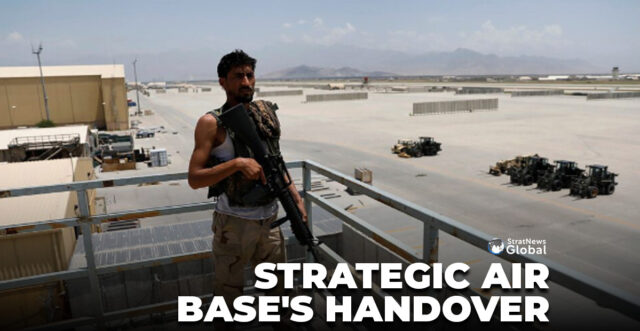The Taliban has transferred control of Afghanistan’s strategic Bagram Air Base to the United States, marking a significant development in regional military dynamics, media reports said.
A U.S. C-17 aircraft recently landed at the base, bringing military vehicles, equipment, and senior intelligence officials, reported Khaama Press, quoting Medium.
Among the reported arrivals is the Deputy Chief of the CIA, highlighting the strategic significance of this renewed American presence at Bagram, the news agency reported.
However, no official confirmation on the handover has been made so far.
Initially, the Taliban had refused to hand over the Bagram Air Base to U.S. forces.
Trump’s Comments On Bagram Air Base
Donald Trump recently said the US is planning to return to Afghanistan, a country its military exited in 2021, in a bid to counter China’s influence over the war-torn South Asian nation.
“I think we should get it back,” the US President was quoted as saying by the media.
He remarked following his first Cabinet meeting since taking over the role of commander-in-chief of the US armed forces.
He reminded that the US gave billions of dollars to Afghanistan and said America should reclaim disused and demilitarized military equipment that was left behind during the chaotic exit four years ago.
The withdrawal took place during former President Joe Biden’s rule, leading to the fall of ex-President Ashraf Ghani’s regime.
With the US forces leaving Afghanistan and Ghani’s government toppling, the Taliban insurgents returned and forcibly took control over the country that has witnessed wars for decades.
“What has bothered me very much is that we gave billions and billions of dollars to Afghanistan, nobody knows that, and yet, we left behind all of that equipment, which would not have happened had I been president at the time,” Trump was quoted as saying by the media.
“I think we should get a lot of that equipment back,” he said.
China Factor
Trump said the US is planning to keep its control over Bagram air base to counter China’s influence.
“The air base is exactly one hour from where China makes its nuclear missiles. So, we were going to keep Bagram,” he said.
“The airbase is one of the biggest airbases in the world. It has one of the biggest and most powerful runways,” he said.
“We gave it up. You know who is occupying it at the moment? China. Because Biden gave it up. So, we’re going to keep that,” Trump said.
Joe Biden-led administration had exited the army from Afghanistan after twenty years since the US invaded the South Asian country following the 9/11 terror attacks.
US Military Equipment
Approximately $7 billion of military equipment that the US transferred to the Afghan government over the course of 16 years was left behind in Afghanistan after the US completed its withdrawal from the country in August, according to a congressionally mandated report from the US Department of Defense viewed by CNN.
Bagram Airfield
The Bagram Airfield-BAF, also known as Bagram Air Base, is located 11 kilometres (6.8 mi) southeast of Charikar in the Parwan Province of Afghanistan.
Bagram Air Base was formerly the largest U.S. military base in Afghanistan.
The base fell into the hands of Taliban rebels after the NATO-trained Afghan National Army had surrendered in 2021.
In the 1950s, Bagram airfield was originally built by the Soviet Union during the early period of the Cold War era.
Both the US and the Soviet Union tried to spread their influence over Afghanistan.
(With inputs from IBNS)
 Afghanistan Peace Campaign
Afghanistan Peace Campaign

